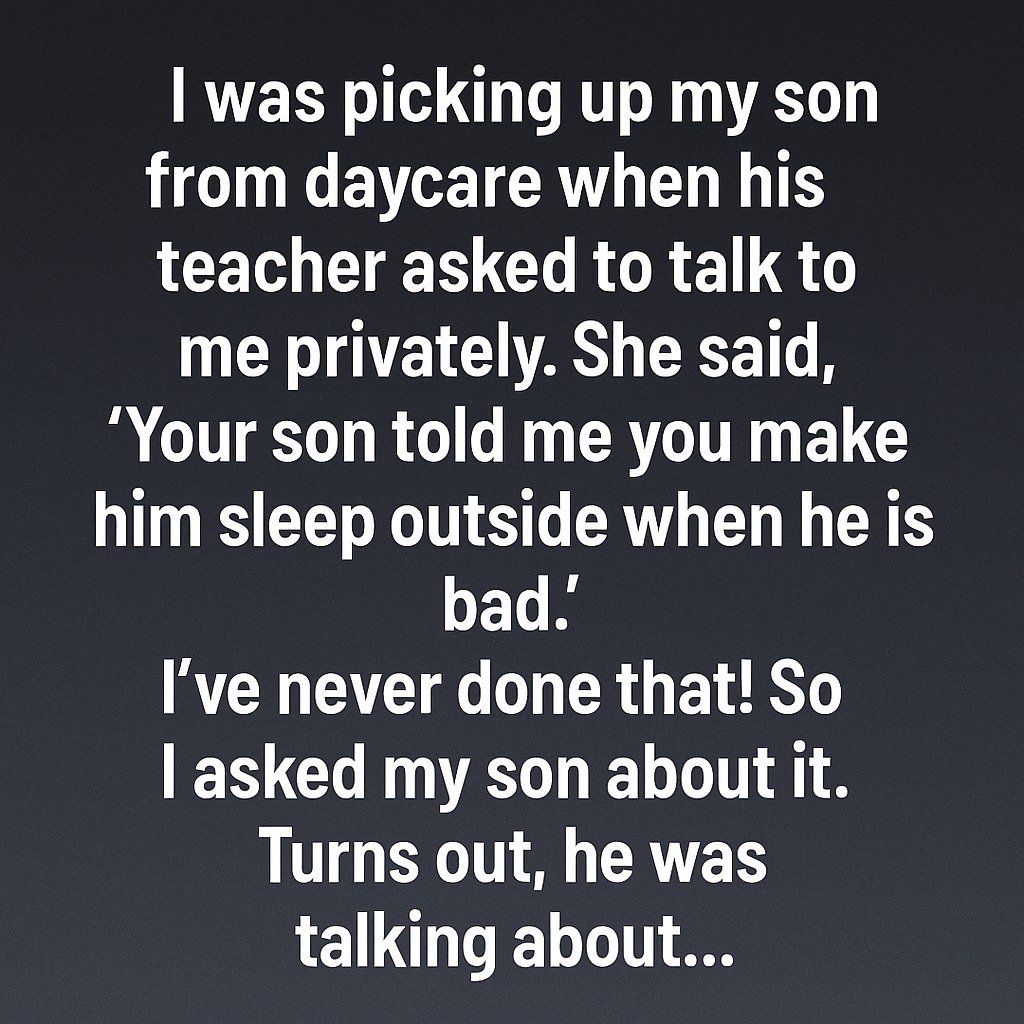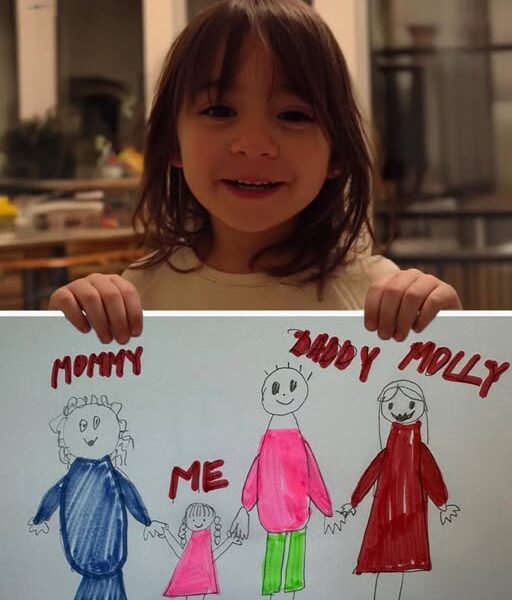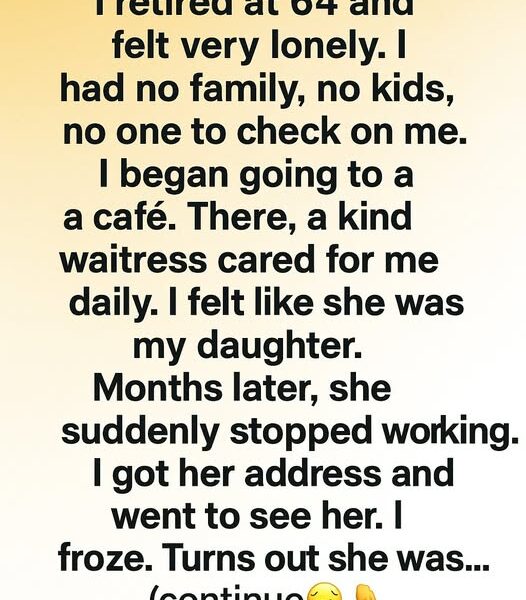It started as an ordinary afternoon. I was picking up my son from daycare when his teacher pulled me aside and asked if we could talk privately. Her face was serious, almost worried. My stomach sank immediately. Then she said something that made my heart skip: “Your son told me you make him sleep outside when he’s bad.”
For a moment, I couldn’t even speak. My mind raced through every possible misunderstanding. I had never done such a thing. I stood there, confused, trying to process what she was saying. I could tell she wasn’t accusing me outright—she was concerned. But still, hearing that sentence was like a punch to the gut.
That evening, once we got home and finished dinner, I sat with my son in the living room. I kept my tone gentle, not wanting to make him feel like he was in trouble. “Hey buddy,” I said softly, “what did you tell your teacher today?” He looked up with a bright smile, completely oblivious to the weight of the situation, and said proudly, “I told her that when I’m naughty, you make me sleep outside with the stars!”
And suddenly, it clicked. I almost laughed out of sheer relief. What he was talking about wasn’t punishment—it was play.
See, in our home, bedtime can sometimes turn into a mini adventure. My son loves camping, so on certain weekends, we pitch a little tent in the backyard. We bring pillows, flashlights, and his favorite snacks, pretending we’re explorers sleeping under the stars. When he’s being a ball of energy before bed, I’ll tease him and say, “Alright, mister, looks like you’re sleeping in the tent tonight!” It’s always been a game—a fun, innocent joke. But to a teacher who only heard “sleep outside,” it sounded alarming.
That misunderstanding opened my eyes in a way I didn’t expect.
Children live in a world filled with imagination. They express themselves through stories, exaggerations, and the bits and pieces of life they interpret in their own colorful way. What they say can sound wildly different from what they mean. Adults, on the other hand, filter everything through experience, logic, and caution. We hear danger where a child sees magic.
In that moment, I realized how easy it is for wires to cross between those two worlds. My son wasn’t lying or confused—he was just speaking in the language of childhood, where everything feels bigger, brighter, and simpler.
Later that night, after he fell asleep, I couldn’t stop thinking about the day. I imagined how many similar misunderstandings happen between parents and children every day. A teacher misreads a story. A parent misinterprets a tantrum. A child mishears something and builds a whole new meaning from it. So many small gaps in understanding that, if left unchecked, can become walls.
The next morning, I went back to daycare early to clear things up. I explained to his teacher that “sleeping outside” wasn’t punishment—it was a beloved family game. She laughed, visibly relieved, and admitted she’d been worried but glad she asked instead of assuming. That conversation stuck with me. It reminded me that communication isn’t just about words; it’s about context, empathy, and intent.
Kids don’t have the vocabulary or life experience to explain their feelings in a way that always makes sense to adults. So it’s on us to slow down and listen—not just to what they say, but to what they mean.
I think about how easily things could’ve gone differently if I’d reacted defensively to the teacher or scolded my son without understanding. Instead, that small misunderstanding became one of the most valuable lessons I’ve had as a parent.
Children communicate with heart, not precision. They speak in emotions—joy, fear, excitement, frustration. When adults rush to interpret those emotions through adult logic, we often miss the truth hiding behind them. The key is to meet them where they are, not where we assume they should be.
Over the next few days, I made a small change in our nightly routine. Before bed, instead of joking about the tent right away, I’d ask him, “Where do you want to dream tonight?” Sometimes he’d say “the moon,” other times “the tent,” and once, “inside my blanket fort.” That small shift gave him a sense of choice and voice—a reminder that communication is a two-way street, even with a child.
It’s easy to underestimate how powerful honest conversation can be with kids. They might be small, but they notice everything. They feel tension, hear tone, and mirror emotion. When adults communicate with openness, we teach children that their voice matters. We show them that being understood isn’t about age—it’s about effort and empathy.
As parents, teachers, or even just adults in a child’s life, we sometimes forget that the way we listen shapes how they learn to express themselves. Every time we take the time to ask instead of assume, we build trust. Every time we clarify instead of correct, we strengthen connection.
That simple moment—one teacher’s question, one child’s story—taught me something bigger than I expected: communication is the bridge between two completely different worlds. And it’s not built with lectures or rules, but with patience, understanding, and curiosity.
Children don’t always have the right words, but they always have meaning. It’s our job to find it.
Now, when I look at my son talking animatedly about his day, I listen differently. I listen not just for accuracy but for heart. When he says, “I saw a dinosaur at school,” I don’t jump to correct him—I ask him what it looked like. Because maybe what he’s telling me isn’t about a dinosaur at all. Maybe it’s about wonder, or fear, or imagination.
And when misunderstandings happen—and they will—I remind myself that communication isn’t about perfection. It’s about connection.
That day at the daycare started with fear and confusion but ended with laughter, clarity, and gratitude. It reminded me that every child’s words are windows into their world—and if we take the time to really look, we don’t just see what they’re saying. We see who they are.
Because in the end, the power of communication between adults and children isn’t just about talking. It’s about learning to listen in a way that lets them feel seen, safe, and understood. And sometimes, that’s all a child really needs—to know that their words, however imperfect, are heard with love.


